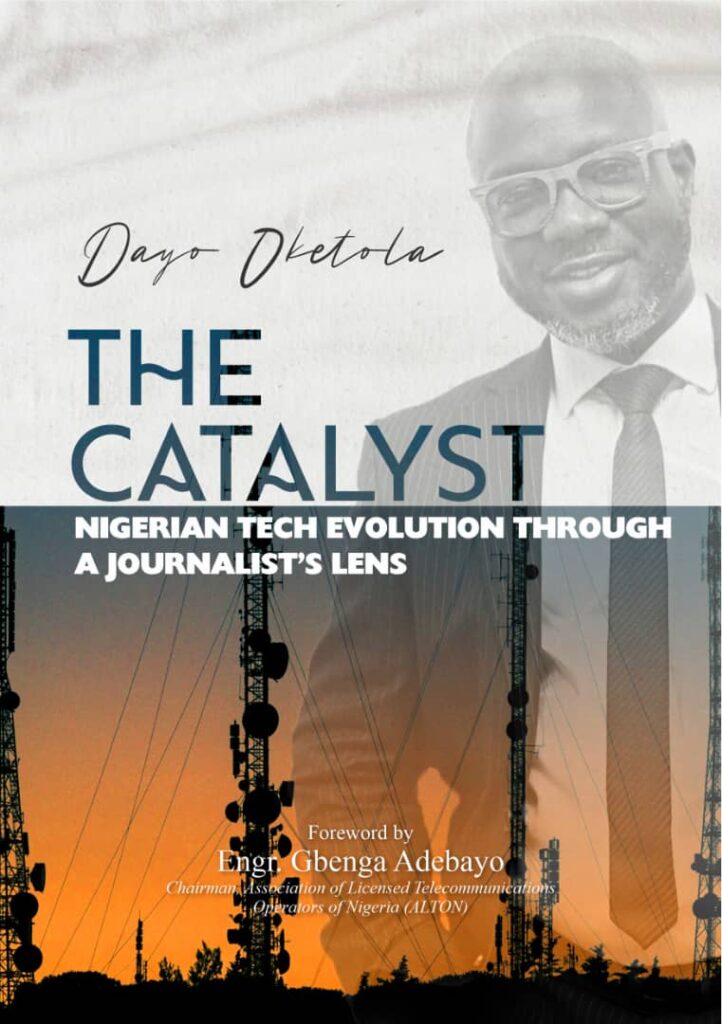Author | Speaker | Columnist | Journalist | PR Consultant | Former Editor, The PUNCH

 Team Lead
Team Lead
African Digital Economy & Inclusivity Conference (AFDEIC)
 MD/CEO
MD/CEO
Commsedge Consult Limited
PR, Corporate Reputation, Govt Relations, Advertising & Events
 President
President
International Visitor Leadership Program Alumni Association of the United States Mission, Nigeria
Member, Nigerian Guild of Editors
Member, Nigerian Institute of Management (Chartered)
Associate, Nigerian Institute of Public Relations
Associate Member, Advertising Regulatory Council of Nigeria (ARCON)
Dayo Oketola
The Catalyst by Dayo Oketola
Blending personal narratives with meticulous industry analyses, ‘The Catalyst: Nigerian Tech Evolution Through a Journalist’s Lens’ by Dayo Oketola offers a profound exploration of Nigeria’s telecommunications evolution, which began with the introduction of GSM in 2001, to the vibrant and competitive industry we witness today. It also highlights the bold initiatives that opened the sector to private investment, leading to over $70 billion in capital inflow and the creation of over 500,000 jobs in over 20 years. This insightful work celebrates remarkable industry achievements while critically addressing the persistent gaps that hinder its full potential. It is a 352-page compendium structured into 14 chapters, each illuminating a different facet of Nigeria’s evolving digital landscape with impressive accuracy and engaging lucidity.
From emphasising how advancements in telecommunications, fintech, and infrastructure have catalysed Nigeria’s national development, the book delves into strategic planning and governance, showcasing successful projects that highlight the importance of foresight in harnessing technology for societal growth. Through real-life stories and case studies, readers will witness the transformative power of innovation in various sectors, from agriculture to education, among others.
In the chapters dedicated to inclusivity in technology, the author confronts the marginalisation of vulnerable groups, particularly persons with disabilities (PWDs) and women. By exploring initiatives aimed at fostering inclusivity, the book advocates for equitable access to technological advancements, emphasising the need for diverse voices in shaping the digital future.
The work further examines the roles of regulatory agencies in shaping the telecoms and fintech sectors. It identified both the successes and failures of existing regulatory frameworks, shedding light on how these have influenced industry innovation and equipping readers with a deeper understanding of the complexities at play in Nigeria’s tech ecosystem. The author investigates the operational challenges faced by NigComSat-1R, Nigeria’s multi-million dollar communication satellite.
The author pushes technology as a catalyst for economic empowerment, particularly among marginalised groups such as rural communities and women. He also illustrates how mobile technology, fintech solutions, and social media platforms have enabled economic inclusion and public health interventions, particularly in containing the Ebola Virus Disease outbreak in 2014. Through powerful personal stories, the book documents the profound impact of technology on individuals’ lives and the broader implications for societal progress.
Finally, the book looks into the future by examining the government’s initiatives aimed at unlocking Nigeria’s digital economic potential through broadband expansion, infrastructure development, and the rise of 5G technology. The author accentuates the critical opportunities on the horizon, exploring how strategic investments and innovations can enhance Nigeria’s global competitiveness. The narrative paints a picture of a vibrant digital economy poised for growth, underscoring the importance of continued collaboration among stakeholders.
It is a collector’s item for ICT sector stakeholders, policymakers, researchers, lecturers, STEM students, university libraries and those interested in understanding the dynamic intersection of technology, policy, and social impact in Nigeria.

